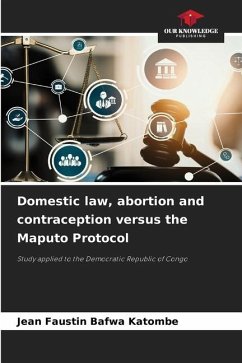Unlike almost all European countries, where abortion and contraception have been decriminalized and access to them has been liberalized, in many African countries abortion and contraception are still criminal offences, with a few rare exceptions. The advent of the Maputo Protocol, the most important international instrument on women's rights to reproductive health and the control of reproductive functions in Africa, ratified by the majority of the continent's countries, has emptied the essence of contrary national laws through its direct applicability, tacitly abrogating them.This study identifies the innovations brought about by the above-mentioned Protocol in the Congolese legal system, and examines the human rights obligations to which the DR Congo is subject.








